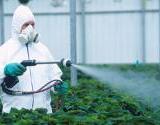Main Menu
Harmful Effects of Pesticides
It’s well known that pesticides in our food and environment can cause serious health problems. There have been countless studies associating pesticide exposure with neurological damage, Parkinson’s disease, birth defects, stillbirth, infertility, asthma and allergies. Cancer’s also linked with exposure to pesticide. Pesticide-related cancers include breast cancer, prostate cancer, kidney and bladder cancers, colorectal cancer, and eye cancer. Children are at particular risk of developing cancer from exposure to these chemicals, including brain cancer, non-Hodgkins lymphoma, soft tissue sarcoma, and leukemia.
The Toxic Release Inventory program states that eight out of the 27 most used pesticides can have harmful effects on pregnancy. Every year, about 150 million pounds of those eight pesticides are used. According to the Library of Medicine, 15 of the most common pesticides may be responsible for genetic defects. 350 million pounds of these chemical compounds are used yearly.
The World Health Organization and the UN Environment Programme state that three million agricultural workers in the developing world are severely poisoned every year, due to their working with pesticides. Around 18,000 of these workers die from their ailments. Another study says that up to 25 million workers in developing countries may experience mild pesticide poisoning every year.
As well as entering our bodies through food, pesticide can drift when it is sprayed on crops. This drift residue ends up in bodies of water such as rivers, lakes, streams, pools, and ponds. It also ends up in run-off water and rain. Even more frightening, pesticide residue can be found on playground equipment, in sandboxes, and in back yards. Inside the home, pesticide residue gets tracked in due to contaminated soil and drifts in through open windows. The chemicals can survive inside the house for weeks at minimum, years at the maximum.
Those with compromised immune systems are most at risk from pesticides. Specific groups who may suffer more from these chemicals’ effects include old folks, ill people, asthmatics, people with allergies and already existing chemical sensitivities, pregnant women, and children. Because kids’ immune systems are maturing, they are extra vulnerable to these dangerous chemicals. Also, because small children like to explore, they may end up being exposed to pesticide residue from touching, smelling or tasting objects adults wouldn’t.
This information is solely for informational and educational purposes only. The publication of this information does not constitute the practice of medicine, family planning, child psychology, marriage counseling and this information does not replace the advice of your physician or other health care or mental health care provider. Neither the owners or employees of NaturalFamilyOnline.com or the author(s) of site content take responsibility for any possible consequences from any treatment, procedure, exercise, dietary modification, application of medication or any other action involving the care of yourself or any family members which results from reading this site. It is always best to speak with your primary health care provider before engaging in any form of self treatment. Additional information contained in our Legal Statement


